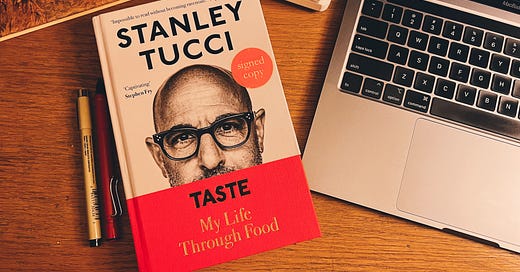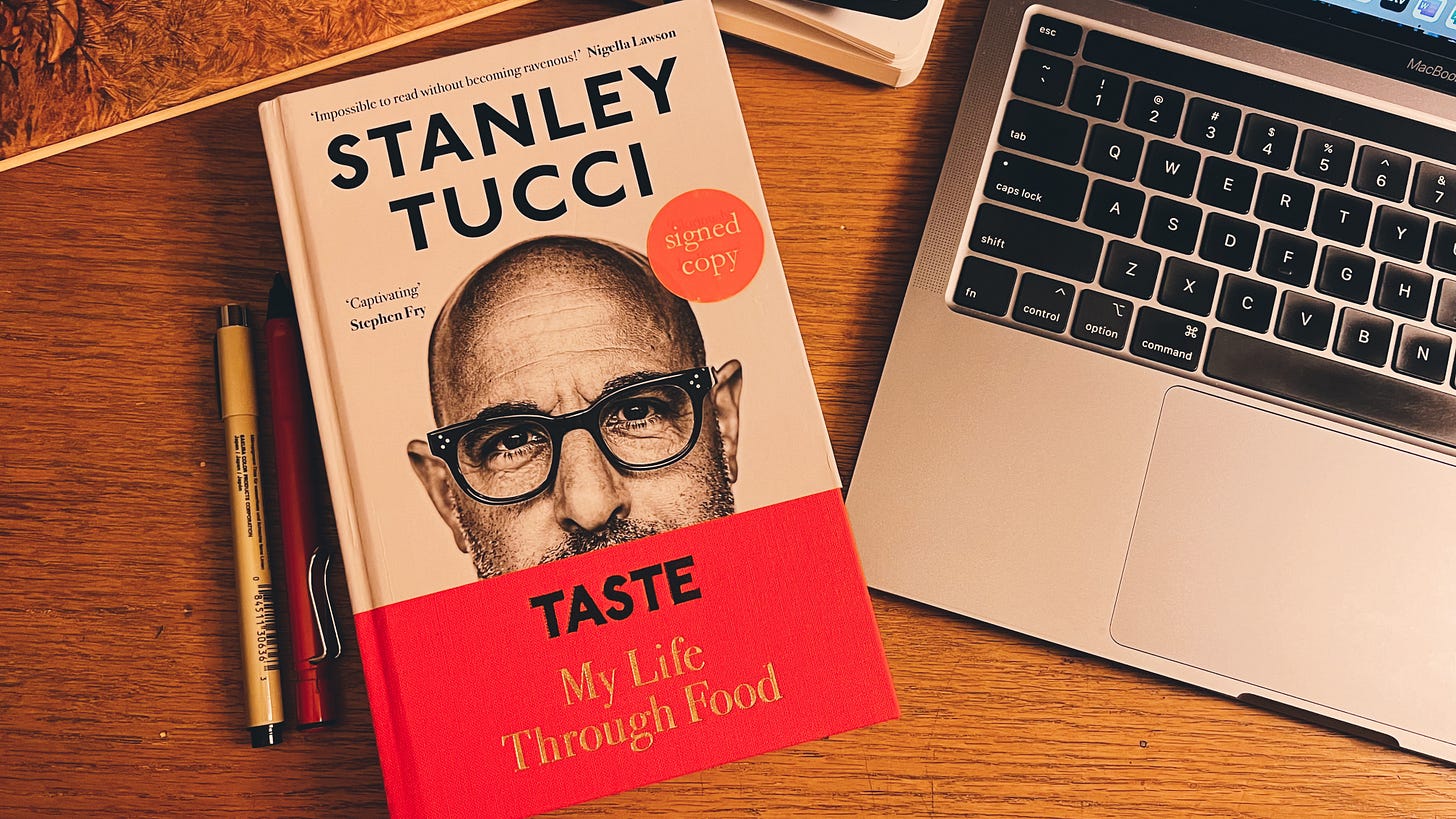Stanley Tucci's eating privileges
A memoir that does nothing to establish its author's standing in the food world
“That’s so good", says Stanley Tucci’s character, Paul Child in the film “Julie and Julia” as he and his wife tuck into dinner at a restaurant in Paris. Tucci clearly loves food, not just in the movie where he plays the husband of Julia Child (played by Meryl Streep), but in real life too. His short videos of him making Negronis and martinis went viral on Instagram during the pandemic , followed by videos of him making pasta. This culminated in a show for CNN, “Searching for Italy” and his memoir about food, “Taste”.
The last is what I recently spent a weekend reading. I’ve had a copy of the book for almost a year now and it is something I kept looking forward to and also kept putting off because I wanted to read it uninterruptedly. I had read his essay for “The Atlantic” on cooking for his family during the lockdowns and really liked it. I had also seen bits of the beautifully shot show, and own one of his cookbooks. Add to that the fact that writing about food is one of my favorite genres. Needless to say, I was looking forward to tucking into this book, a memoir with recipes.
Broadmindedness and sensitivity are two things that one can never have enough of and which lend grace to any sort of writing. In “Taste” Tucci falls short of both at times. I love Italian food and while I wouldn’t call any cuisine easy, pasta is one of the most straightforward things to cook or eat, especially compared to French, Asian, South Asian and many other cuisines. Therefore, I am a little taken aback when he talks of Italian cuisine and “heirloom recipes” as a gift from God that others are denied. Some of the passages that made me the most uncomfortable were ones describing his outsized reaction to somebody cooking or eating pasta in a way that he considers “wrong”. In case you want second-hand cringe to understand what I mean, I am happy to quote from the book:
There have been times when someone in my household (no names) made a traditional family sauce and served it with a completely incompatible pasta. I cannot describe the feeling I have when confronted with this. First, I am angry at myself for not being able to cook the meal, most likely because I was doing something annoying like acting…, and second, I am confounded that whoever made the choice (no names) does not innately know that, as per example, the combination of star pasta and a meat ragù is an act of heresy. As far as I’m concerned they may as well have just cut out my tongue with a broadsword and danced on the graves of my ancestors. Of course, this reaction is extreme and completely unfair. How could they possibly know the finer points of pasta/sauce pairings unless they were raised by an Italian or a food freak? However, when this happens, I take a deep breath, quietly suggest a more appropriate coupling next time (although I vow to myself that there will be no next time because I will be present to stop it), and try not to pity them because they were raised by philistines.
This whole passage, and several others, drip with an unfounded condescension. It is not only over the top but also, if there is an attempt at humor, it falls flat. There is no “innate” knowledge when it comes to food - everybody is raised in a multicultural environment with various cultural influences coexisting. And if chefs are made on the foundation of experimentation, how can you be this anal about home cooks using a different sauce with any type of pasta? This attitude makes even less sense when you’ve got a show about cooking airing on television.
Tucci, however, isn’t alone in this sort of over the top behavior. I’ve met several people who wield their knowledge of food, and so-called expertise at cooking, as weapons. At a stone’s throw in any direction, you can meet an older desi woman holding on to culinary traditions with both hands and berating younger generations of women for cooking the “wrong” way. Their biases are not limited to culinary traditions either - they may extend to clothes, women working, driving, what have you. The same is true of older men, who use tradition as a tool to keep younger, especially female, generations in “their place”, defined by whatever feels safest to these protagonists. Food is supposed to be joyful. Even in the judgmental narratives built by the above-described people, there is a parallel line of discourse that extolls food’s ability to bring people together, the necessity of eating meals together as a family and its cultural value. The same people will laugh at white people for using only salt in their food but still be proud that “chicken tikka masala” is Britain’s unofficial national dish. (Haters will say that such a dish doesn’t exist in desi cuisine but those are not the haters we want to hear when doing a jig for reverse colonization so no, thank you).
Most places’ culinary cultures still rely on unpaid female labour. The preservation and perpetuation of tradition relies on the continued cooperation of marginalized classes, as well as adherence to difficult and outdated practices. For example, in a very desi context, this may look like using an old madhani to make lassi, which would involve significant physical labour and discomfort, as opposed to using an electric blender. There are still people who would argue for the taste and flavor and the sheer quality of the butter generated by the former, older technique. Food snobbery may sound cool but I, personally, am not in favor of practices that burden people with unnecessary work, especially people who are not paid appropriately for it and perhaps may not have the space to refuse. My recommendation to the snobs would be to make it themselves.
Tucci, meanwhile, describes at some length a family tradition which fits the contours of this argument. There is a Christmas Day special called a timpano, notorious amongst both his successive wives and I’m sure, with several female readers. He claims that it is a very “special dish that is served in [their] home” on this day. I don’t think I’ll do as good a job of explaining the way he describes the whole event so allow me to quote:
The recipe and the tradition of serving it on special occasions, particularly Christmas, were brought to America by my father’s family. I never remember not having it on Christmas Day, whether we were celebrating at our home or at the home of one of my dad’s siblings. It is quite a showstopper. However, its preparation is very labour-intensive and the cooking process requires much time and attention. It is for this last reason that, even though we would not be sitting down to eat until about two or three p.m, my parents would arrive at about eleven a.m, to begin the process of finishing the cooking of the timpano, which they had painstakingly assembled a couple of days before.
Upon hearing the sound of car tires on the gravel drive… I would look sheepishly at Kate. She would sigh quietly and then, as she slowly turned and stared at me, I would see something die in her eyes. At this point my anxiety level would skyrocket and I’d flit off to the bar to see if I couldn’t find liquid calm in a Bloody Mary… [My parents] would be so happy and excited, how could I even think of being put out by their extremely early arrival? (Well, perhaps not so much as my poor wife).
…. I am of course being a bit harsh when I make it seem as though Christmases were ruined completely by an inanimate drum of past-filled pastry, but sometimes it came close.
(The words in bold above are put thus by me, not by Tucci in his book.)
This is an almost perfect illustration of the way male privilege and tradition operate. Christmas is supposed to be a joyful event for everyone, but clearly, even when there is 100% awareness of the burdened person’s emotions, tradition is deemed more important than that person’s happiness. Tucci goes on to describe the conversation he would have with his (now deceased) first wife at the end of every Christmas Day. He writes that she had the patience of a saint but even she couldn’t help losing her temper at this and then “a discussion about tradition, how not to insult family, or whether we should just go skiing over Christmas etc., would ensue.” The worst part of this whole chapter is his confession that nobody in his household, not his wife nor his children, liked this dish and he would have the pleasure of finishing it alone. No matter how funny Tucci thinks he’s being while writing this whole thing down, it only makes him come across as insensitive.
This is an oft-discussed and fought-over subject: pleasure, labour and tradition and many would-be upholders of the last of these couch it in terms of “taking one for the team”. For some strange reason, as demonstrated above, that never amounts to doing that grunt work themselves. Tucci describes taking refuge in alcohol to deal with “his anxiety” on Christmas Day but what does he have to be anxious about, one may well ask.





A very well written article. I am reminded of a lady I knew long ago describing how her inlaws expected her to cook goat hooves called payas overnight so as to get them extremely tender but not to let the joints separate. Wow I still haven't been able to figure out that one after more then 30 years.
People who can cook something exceptional are often conceited about their expertise. This makes the food taste not so nice!
Personally I find it difficult to read memoirs unless there is something relateable with the writer. Huge fan of Tucci though. After reading this review, not so much anymore 😕